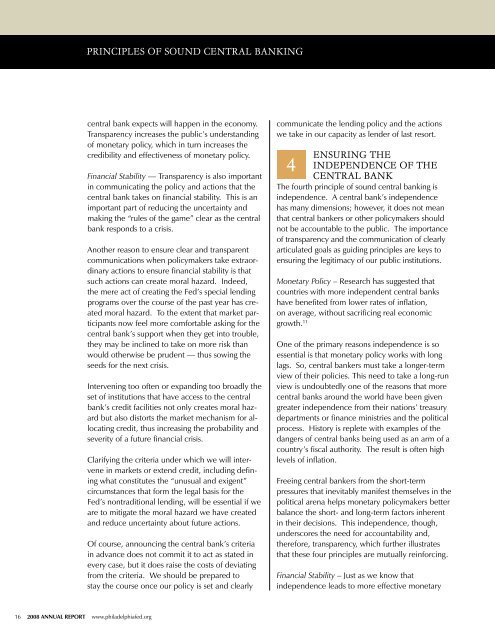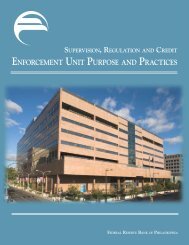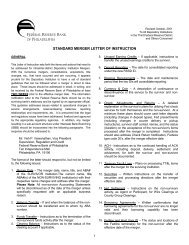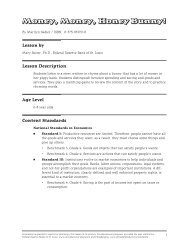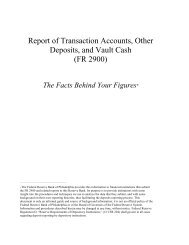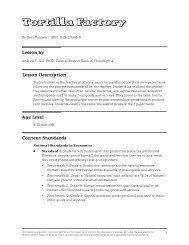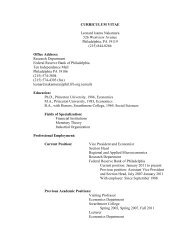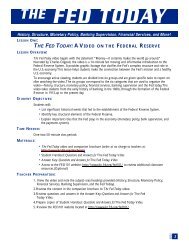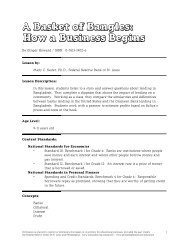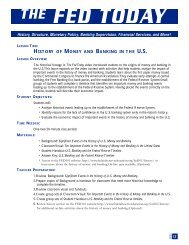Complete 2008 Annual Report - Federal Reserve Bank of Philadelphia
Complete 2008 Annual Report - Federal Reserve Bank of Philadelphia
Complete 2008 Annual Report - Federal Reserve Bank of Philadelphia
You also want an ePaper? Increase the reach of your titles
YUMPU automatically turns print PDFs into web optimized ePapers that Google loves.
Principles <strong>of</strong> Sound Central <strong>Bank</strong>ing<br />
central bank expects will happen in the economy.<br />
Transparency increases the public’s understanding<br />
<strong>of</strong> monetary policy, which in turn increases the<br />
credibility and effectiveness <strong>of</strong> monetary policy.<br />
Financial Stability — Transparency is also important<br />
in communicating the policy and actions that the<br />
central bank takes on financial stability. This is an<br />
important part <strong>of</strong> reducing the uncertainty and<br />
making the “rules <strong>of</strong> the game” clear as the central<br />
bank responds to a crisis.<br />
Another reason to ensure clear and transparent<br />
communications when policymakers take extraordinary<br />
actions to ensure financial stability is that<br />
such actions can create moral hazard. Indeed,<br />
the mere act <strong>of</strong> creating the Fed’s special lending<br />
programs over the course <strong>of</strong> the past year has created<br />
moral hazard. To the extent that market participants<br />
now feel more comfortable asking for the<br />
central bank’s support when they get into trouble,<br />
they may be inclined to take on more risk than<br />
would otherwise be prudent — thus sowing the<br />
seeds for the next crisis.<br />
Intervening too <strong>of</strong>ten or expanding too broadly the<br />
set <strong>of</strong> institutions that have access to the central<br />
bank’s credit facilities not only creates moral hazard<br />
but also distorts the market mechanism for allocating<br />
credit, thus increasing the probability and<br />
severity <strong>of</strong> a future financial crisis.<br />
Clarifying the criteria under which we will intervene<br />
in markets or extend credit, including defining<br />
what constitutes the “unusual and exigent”<br />
circumstances that form the legal basis for the<br />
Fed’s nontraditional lending, will be essential if we<br />
are to mitigate the moral hazard we have created<br />
and reduce uncertainty about future actions.<br />
Of course, announcing the central bank’s criteria<br />
in advance does not commit it to act as stated in<br />
every case, but it does raise the costs <strong>of</strong> deviating<br />
from the criteria. We should be prepared to<br />
stay the course once our policy is set and clearly<br />
communicate the lending policy and the actions<br />
we take in our capacity as lender <strong>of</strong> last resort.<br />
Ensuring the<br />
4 Independence <strong>of</strong> the<br />
Central <strong>Bank</strong><br />
The fourth principle <strong>of</strong> sound central banking is<br />
independence. A central bank’s independence<br />
has many dimensions; however, it does not mean<br />
that central bankers or other policymakers should<br />
not be accountable to the public. The importance<br />
<strong>of</strong> transparency and the communication <strong>of</strong> clearly<br />
articulated goals as guiding principles are keys to<br />
ensuring the legitimacy <strong>of</strong> our public institutions.<br />
Monetary Policy – Research has suggested that<br />
countries with more independent central banks<br />
have benefited from lower rates <strong>of</strong> inflation,<br />
on average, without sacrificing real economic<br />
growth. 11<br />
One <strong>of</strong> the primary reasons independence is so<br />
essential is that monetary policy works with long<br />
lags. So, central bankers must take a longer-term<br />
view <strong>of</strong> their policies. This need to take a long-run<br />
view is undoubtedly one <strong>of</strong> the reasons that more<br />
central banks around the world have been given<br />
greater independence from their nations’ treasury<br />
departments or finance ministries and the political<br />
process. History is replete with examples <strong>of</strong> the<br />
dangers <strong>of</strong> central banks being used as an arm <strong>of</strong> a<br />
country’s fiscal authority. The result is <strong>of</strong>ten high<br />
levels <strong>of</strong> inflation.<br />
Freeing central bankers from the short-term<br />
pressures that inevitably manifest themselves in the<br />
political arena helps monetary policymakers better<br />
balance the short- and long-term factors inherent<br />
in their decisions. This independence, though,<br />
underscores the need for accountability and,<br />
therefore, transparency, which further illustrates<br />
that these four principles are mutually reinforcing.<br />
Financial Stability – Just as we know that<br />
independence leads to more effective monetary<br />
16 <strong>2008</strong> <strong>Annual</strong> <strong>Report</strong> www.philadelphiafed.org


